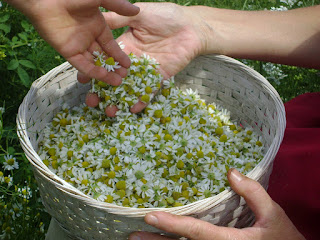Our family used to take a lot of vitamins. But over the years I noticed that the more vitamins I took the worse I felt. Then we finally quit taking daily supplements, and I have noticed that the odd symptoms that I had for years disappeared. And the more I have learned, the more I am convinced that most supplements are not good for us. They are either in forms that our bodies cannot use -and are many times toxic to the body, or they are separated from the other nutrients essential to their assimilation in the body. Foods are our safest option! And herbs are foods!
With a little study, you can become familiar with the nutrients in specific herbs. Most Americans are deficient in calcium because we eat so many processed foods and pasteurize our milk, so that would be a good mineral to start consuming through herbal teas. Both oat straw and horsetail (shavegrass) are high in calcium. Another great herb to start with is Alfalfa. It is loaded! Red Raspberry leaf is also a wonderful herb to have around - nothing compares for pregnant women and children. It is good for the flu, constipation and fever. I could go on and on.
 |
| A basket of Chamomile tea |
Also, not all teas are created equal. I do not recommend drinking teas out of a box. I have found that these teas are not very good quality. Your efforts will be much better rewarded if you buy bulk organic herbs. (mountainroseherbs.com or bulkherbstore.com)
The possibilities for tea recipes are endless, but this list will give you some ideas to help you get started. As a general rule, use one teaspoon of tea to one cup of boiling water. Pour the water over the tea and steep for 5-15 minutes. When I make tea for my family, I just heat my water in an eight cup stainless steel pot. Once the water is boiling, I turn off the heat and add my herbs. Then I put the lid on and let it steep. Always cover your tea while it is steeping! If you don't, the constituents from the herbs will evaporate, and you will be left with an inferior cup of tea.
Tea Recipes
All the recipes below are made with 8 cups of water.
1T. Oatstraw
1T. Alfalfa
1T. Peppermint
Alfalfa has been called the "King of Herbs" because it is so rich in nutrients. Oatstraw is high in calcium and magnesium and is usually found in herbal combinations relating to the heart.
1T. Nettle
1T. Peppermint
1T. Licorice Root
This tea is good for fatigue or exhaustion.
1 tsp, Anise seed
1T. Nettle
1T. Red Clover
1T. Licorice Root
Red Clover is a great blood purifier. Nettle is rich in chlorophyll, iron, and vitamin C. It is also a natural anti-histamine.
1 tsp. ground Cinnamon
2 tsp. Red Raspberry leaf
2 tsp. Dandelion Root
2 tsp. Peppermint
Dandelion is a good blood purifier and liver cleanser.
4 slices of Ginger root
1T. Black tea
1T. Peppermint
Ginger is great for morning sickness, nausea, and, motion sickness
1T. Catnip
1T. Fennel
1T. Red Raspberry
Catnip and fennel are good for stomach discomfort, indigestion, gas, and bloating. It will also help a colicky baby. Raspberry leaf is high in vitamin C, manganese, iron, and niacin, and it also helps with an upset stomach.
2 tsp. Alfalfa
2 tsp. Nettle
2 tsp. Horsetail
2 tsp. Peppermint
1 tsp. ground Cinnamon
Horsetail is very rich in silica. Cinnamon's anti-fungal properties will benefit the whole body and make the tea taste yummy! :)
As I said before, the combinations are endless! Other herbs that I like to use for tea are:
Bilberry leaf and berry, Elderberries, Chamomile, Mullein, and Lemon Balm.
Tip: Whenever you are using a root, go ahead and add the root to your water right away and let it come to a boil. Roots need to cook longer than leaves and berries in order to get the properties out of them.
Enjoy your vitamins and minerals! :)
1 comment:
Thanks for the recipes...I am really excited to try making my own herbal tea. I really enjoy drinking tea, as well. :)
Great post!
Post a Comment